
ACTA ENTOMOLOGICA MUSEI NATIONALIS PRAGAE
Scope & Guideline
Bridging Research and Discovery in Entomology
Introduction
Aims and Scopes
- Taxonomy and Systematics:
The journal regularly publishes detailed taxonomic revisions, descriptions of new species, and notes on the classification of various insect groups, aiding in the understanding of biodiversity. - Morphological Studies:
Research articles often focus on the morphology of different life stages of insects, providing insights into evolutionary relationships and ecological adaptations. - Biodiversity and Biogeography:
Papers frequently explore the distribution and ecological roles of insects, highlighting patterns of biodiversity across different geographical regions. - Integrative Taxonomy:
The journal emphasizes integrative approaches that combine morphological, molecular, and ecological data to resolve taxonomic uncertainties. - Faunistic Surveys:
It publishes findings from faunistic surveys that contribute to the knowledge of insect diversity in specific regions, often documenting new records or species.
Trending and Emerging
- New Species Descriptions:
There is a significant increase in the description of new species across various insect orders, highlighting the ongoing discovery of biodiversity and the urgency of documenting it. - Genomic and Molecular Approaches:
An emerging trend is the incorporation of molecular techniques and genomic analyses to resolve taxonomic questions and understand evolutionary relationships. - Collaborative Regional Studies:
Collaborative studies focusing on specific regions are on the rise, indicating a trend towards understanding local biodiversity in a global context. - Conservation and Biodiversity Studies:
The journal is increasingly publishing research that addresses conservation issues, reflecting a growing recognition of the importance of biodiversity preservation. - Integrative Taxonomy:
There is a notable trend towards integrative taxonomy, where researchers combine traditional methods with modern genetic tools to provide a more comprehensive understanding of insect diversity.
Declining or Waning
- Ecological Impact Studies:
There has been a noticeable reduction in papers focusing specifically on the ecological impacts of insect populations, such as studies on pest management or ecosystem services. - Behavioral Studies:
Research exploring the behavioral aspects of insects, such as mating or foraging behavior, seems to be less frequently represented in recent publications. - Historical Taxonomy:
The focus on historical or classical taxonomic studies, which may not incorporate modern techniques, appears to be waning as the field moves towards more dynamic and integrative methodologies. - Invasive Species Research:
While still important, there seems to be fewer dedicated studies on invasive insect species, perhaps overshadowed by broader biodiversity and conservation themes. - Comprehensive Reviews of Established Genera:
The journal has shifted away from extensive reviews on well-established genera, favoring new species descriptions and novel findings instead.
Similar Journals
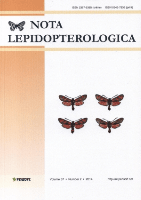
NOTA LEPIDOPTEROLOGICA
Championing open access for groundbreaking research.NOTA LEPIDOPTEROLOGICA, an esteemed journal published by Pensoft Publishers, has been a cornerstone in the fields of Insect Science, Animal Science, Ecology, and Evolution since its inception in 1995, with a commitment to open access publication since 2014. Based in Sofia, Bulgaria, this journal serves as a vital platform for researchers and professionals alike, facilitating the dissemination of significant findings related to Lepidoptera and broader ecological interactions. With an impressive scope covering vital aspects of biodiversity and taxonomy, NOTA LEPIDOPTEROLOGICA holds a Q3 ranking in its categories according to the 2023 metrics and plays a crucial role in advancing our understanding of insect science. By fostering international collaboration among scholars, the journal not only emphasizes the ecological importance of Lepidoptera but also contributes to global conservation efforts, making it an indispensable resource for students and experienced researchers aiming to deepen their knowledge in these fields.
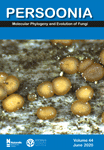
PERSOONIA
Illuminating the Path of Ecological DiscoveryPERSOONIA, a distinguished journal published by RIJKSHERBARIUM, serves as a pivotal platform for the dissemination of high-quality research in the fields of Ecology, Evolution, Behavior, and Systematics, as well as Plant Science. Established with a commitment to advancing scientific knowledge, PERSOONIA has achieved an impressive Q1 ranking in these areas, highlighting its significant impact within the academic community, as evidenced by its ranking of #12 out of 721 journals in its field, placing it in the top 2% of publications. With a publication history that spans from 1996 to present, the journal regularly features innovative studies that push the boundaries of understanding in ecological and botanical sciences. While Open Access options are currently limited, researchers and professionals alike benefit from subscription access to this vital resource. Located in the Netherlands, PERSOONIA continues to be a beacon for scholars aiming to enrich the discourse in evolving ecological and plant science disciplines.
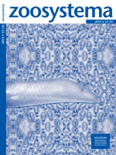
ZOOSYSTEMA
Catalyzing Knowledge in Animal ScienceZOOSYSTEMA is a prestigious academic journal published by PUBLICATIONS SCIENTIFIQUES DU MUSEUM, PARIS, specializing in the fields of Animal Science, Zoology, and Ecology. With a focus on advancing the understanding of biodiversity and evolutionary processes, this journal serves as a vital platform for researchers to disseminate significant findings and foster discussions within the scientific community. Boasting an impressive categorization in the Q2 Quartile rankings for both its primary fields, ZOOSYSTEMA is recognized for its impact and quality, as indicated by its notable positions in the Scopus rankings. While currently not Open Access, the journal provides essential insights and comprehensive reviews across its volumes published since 1998, making it a cornerstone in zoological and ecological research. Researchers, professionals, and students alike will find ZOOSYSTEMA an invaluable resource for understanding complex biological systems and their interrelations, contributing to informed conservation and management efforts globally.

ARTHROPODA SELECTA
Connecting ecology, evolution, and behavior through arthropods.ARTHROPODA SELECTA is a prestigious journal dedicated to advancing the field of Ecology, Evolution, Behavior, and Systematics with a specific focus on arthropods, published by KMK Scientific Press Ltd in collaboration with Moscow State University. This journal, issued under the ISSN 0136-006X, has established its significance in the academic community by consistently providing high-quality research articles and reviews that contribute to our understanding of arthropod diversity and ecological significance. As evidenced by its classification in the Q2 quartile in both Ecology, Evolution, Behavior and Systematics and Insect Science categories as of 2023, ARTHROPODA SELECTA stands out for its rigorous peer-review process and impactful contributions to the field. Although it currently does not offer an open-access model, the journal ensures a broad dissemination of knowledge to researchers, professionals, and students alike. With a commitment to bridging gaps in existing literature and fostering interdisciplinary dialogue, ARTHROPODA SELECTA is a vital resource for anyone interested in the diverse and dynamic world of arthropods.

RAFFLES BULLETIN OF ZOOLOGY
Advancing Knowledge in Animal Science and EcologyRaffles Bulletin of Zoology, published by the National University of Singapore's Lee Kong Chian Natural History Museum, serves as a prestigious platform for the dissemination of cutting-edge research in Animal Science and Zoology, as well as Ecology, Evolution, Behavior and Systematics. With a current impact factor reflective of its Q2 category in both fields, this journal not only enhances its visibility in the academic community but also provides valuable insights into the complexities of biodiversity and conservation efforts. Covering a wide array of topics, Raffles Bulletin facilitates interdisciplinary collaboration and serves as an essential resource for researchers, professionals, and students alike. It is indexed in Scopus, ranking #233 out of 490 in Animal Science and Zoology and #406 out of 721 in Ecology, ensuring that the research published contributes significantly to the global discourse on wildlife and ecosystem management. Since its inception in 1996, this journal has bridged gaps in knowledge and continues to foster a deeper understanding of the living world.

ANNALES ZOOLOGICI FENNICI
Unlocking the Secrets of Animal Behavior and SystematicsANNALES ZOOLOGICI FENNICI, published by the Finnish Zoological Botanical Publishing Board, is a prominent scientific journal dedicated to advancing the fields of Animal Science, Zoology, Ecology, Evolution, Behavior, and Systematics. Based in Finland and serving an international audience, this journal has been an essential resource since its inception in 1974, offering valuable insights into biodiversity, conservation, and ecological dynamics. While it holds a respectable Q3 quartile ranking across several relevant categories in 2023, its impactful contributions to the scientific community continue to promote critical discussions and foster research collaborations. Although the journal is not currently open access, its robust indexing in Scopus and recognition within the academic community underscore its significance. As a researcher, professional, or student, engaging with the ANNALES ZOOLOGICI FENNICI not only enriches your knowledge but also aligns you with the forefront of zoological research and conservation studies.
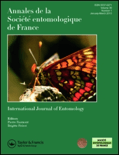
ANNALES DE LA SOCIETE ENTOMOLOGIQUE DE FRANCE
Bridging knowledge gaps in insect biology.ANNALES DE LA SOCIETE ENTOMOLOGIQUE DE FRANCE, published by Taylor & Francis Ltd, is a prestigious journal that focuses on the dynamic field of entomology, offering a platform for the dissemination of innovative research related to insect science and ecological systems. With an increasing impact factor and notable quartile rankings (Q2 in both Ecology, Evolution, Behavior and Systematics, and Insect Science), the journal serves as a vital resource for researchers, professionals, and students alike, stimulating advances in our understanding of insect biology and its implications for broader ecological contexts. Although it is not an Open Access journal, it boasts a strong reputation within the academic community, as evidenced by its significant Scopus rankings and a commitment to high-quality peer-reviewed content. With its extensive historical archive since 1988 and a continuous publication schedule through 2024, ANNALES DE LA SOCIETE ENTOMOLOGIQUE DE FRANCE remains an essential reference for those engaged in the study of entomology and related ecological fields. For more information, visit the publisher's site at Taylor & Francis Ltd.
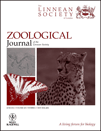
ZOOLOGICAL JOURNAL OF THE LINNEAN SOCIETY
Connecting past discoveries with future innovations in ecology.Zoological Journal of the Linnean Society, published by Oxford University Press, stands as a prestigious vessel for scholarly discourse in the fields of Animal Science and Ecology. With an ISSN of 0024-4082 and E-ISSN 1096-3642, this journal has an illustrious history dating back to its inception in 1866, and has consistently contributed groundbreaking research that shapes our understanding of zoology and evolutionary biology. Operating out of the United Kingdom, the journal boasts an impressive Q1 ranking in both Animal Science and Zoology and Ecology, Evolution, Behavior and Systematics, positioning it among the top tier of its category. With a significant presence in the academic landscape, the journal ranks 24th among 490 in Animal Science and 97th among 721 in Ecology, reflecting its impact and relevance in the field. Although it is not an open access journal, the wealth of knowledge it offers is invaluable for researchers, professionals, and students alike, aiding in the advancement of zoological sciences.
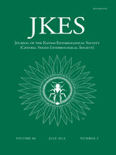
JOURNAL OF THE KANSAS ENTOMOLOGICAL SOCIETY
Unveiling the Secrets of Insect LifeJOURNAL OF THE KANSAS ENTOMOLOGICAL SOCIETY, published by the Kansas Entomological Society, serves as a vital platform dedicated to the field of entomology and insect science. With an ISSN of 0022-8567 and an E-ISSN of 1937-2353, this journal has established itself since its inception in 1994, continuing to contribute valuable research up to 2024. Despite its current Q4 categorization in the 2023 Insect Science rankings, it ranks 106 out of 181 in Scopus, representing a significant opportunity for researchers to disseminate their findings in a supportive and engaged community. Although it is not an open-access journal, its commitment to rigorous peer review and relevance in agricultural and biological sciences makes it an essential resource for professionals, scholars, and students alike. The journal's focus on local and regional entomological issues often addresses broader ecological impacts, showcasing the importance of insects in environmental health and agriculture. We invite you to explore the rich tapestry of findings and discussions within this esteemed publication.
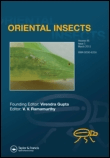
ORIENTAL INSECTS
Exploring the Rich Tapestry of Insect DiversityORIENTAL INSECTS is a distinguished journal dedicated to advancing the field of Insect Science, published by the reputable Taylor & Francis Ltd. With its long-standing history since 1967, this journal provides a platform for innovative research focused specifically on the diverse insect fauna of the Oriental region, encompassing topics such as taxonomy, ecology, physiology, and behavior. The journal is indexed with an ISSN of 0030-5316 and an E-ISSN of 2157-8745, making it easily accessible to a global audience. Although it currently does not operate under an Open Access model, its rigorous peer-review process ensures the dissemination of high-quality research. As a Q4 journal in the Insect Science category for 2023 and ranked 103 out of 181 in Scopus, ORIENTAL INSECTS remains a vital resource for researchers, professionals, and students seeking to enhance their understanding of insect biodiversity and conservation. Located in the United Kingdom, it is committed to promoting the latest scientific findings and fostering collaboration among entomologists worldwide, contributing significantly to the academic community.